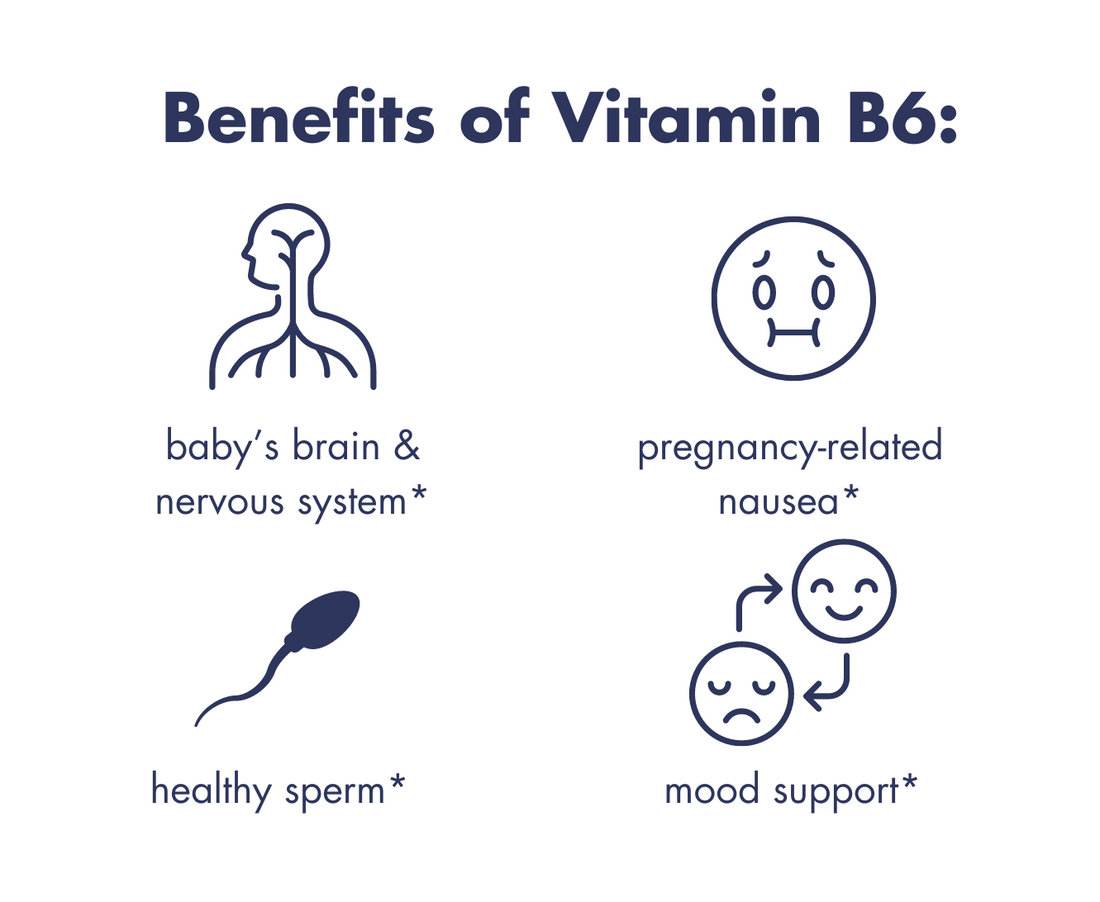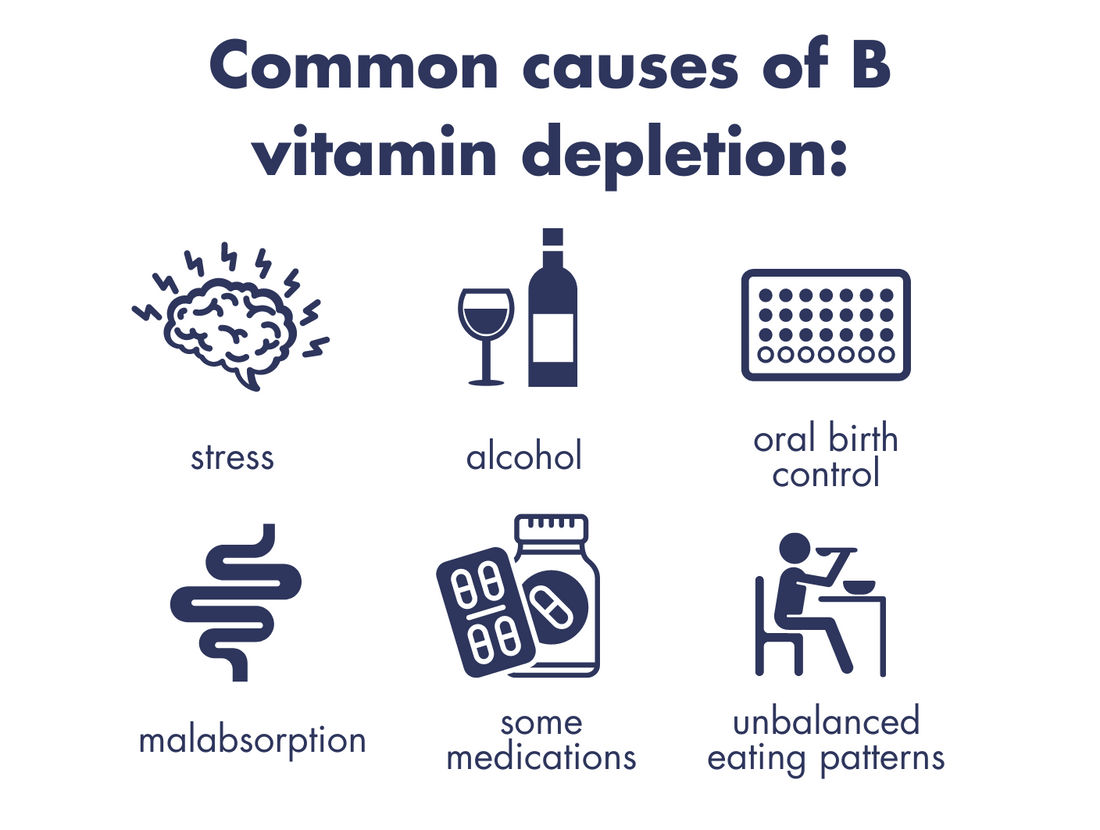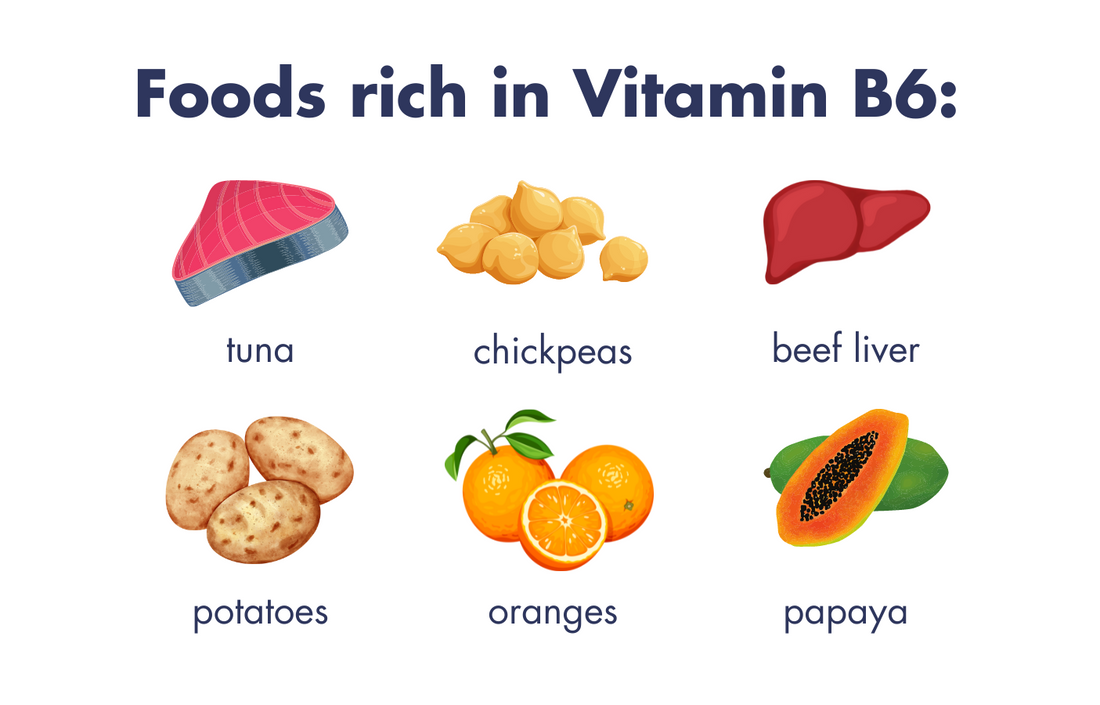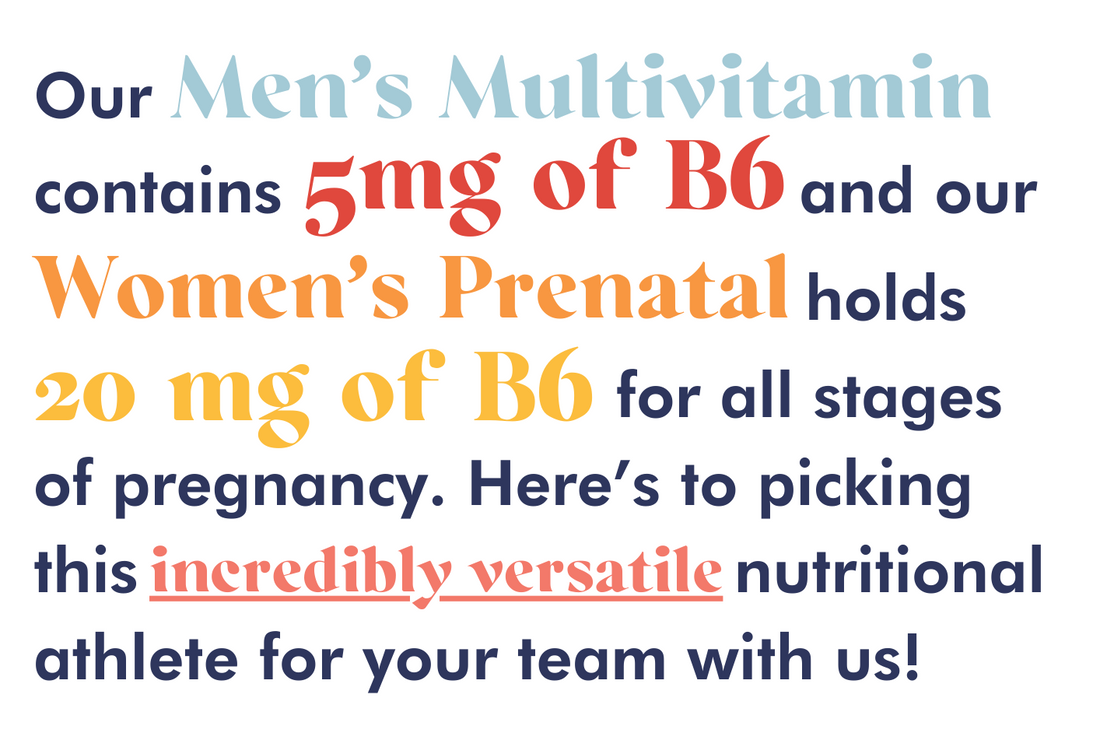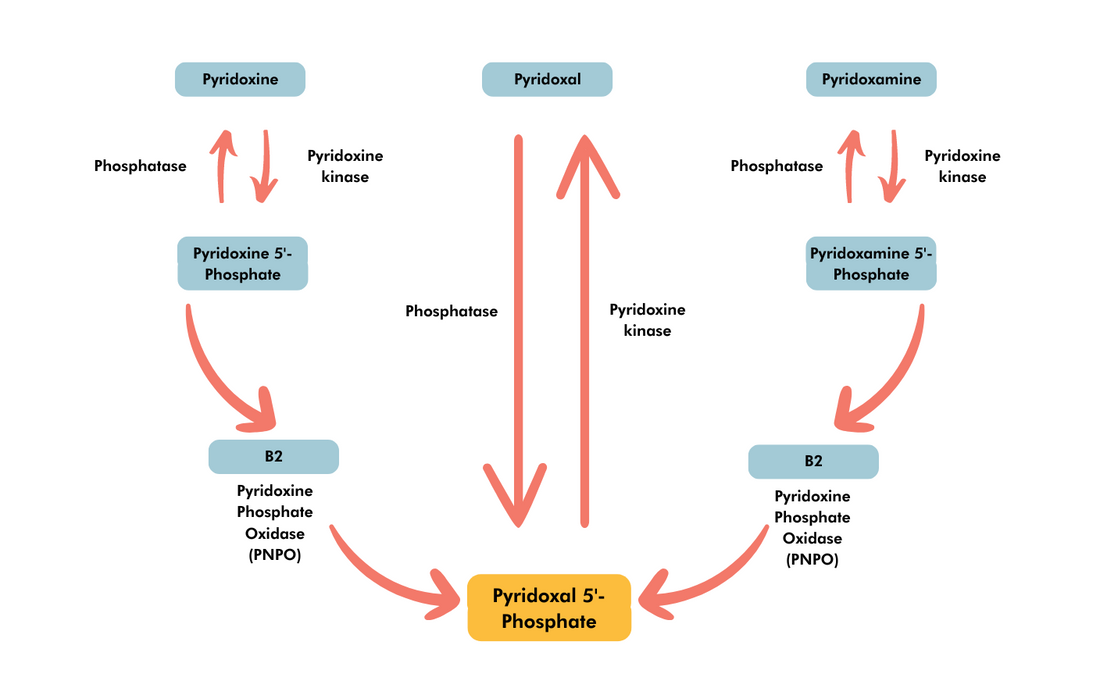The Truth About Vitamin B6 for Preconception, Pregnancy, and Postpartum
TL;DR
- Vitamin B6 is essential for menstrual cycle regularity, stable mood, and fertility, supporting preconception health.
- During pregnancy, B6 aids in managing nausea, supporting blood glucose levels, and postpartum mood stabilization.
- In men, B6 supports healthy sperm quality, crucial for fertility, and overall reproductive health.

We all know that B vitamins are critically important for our health, regardless of fertility status, but there are just so many to keep track of, we can see how it gets confusing.
Lucky for you, navigating the Bs is one of our passions and specialties!
We’d love to spend some time helping you get to know B6, because it can be a stealthy secret weapon in many cases without you even realizing it.
What is B6? Aside from — obviously — one of many B vitamins?
Vitamin B6 is an essential nutrient that wears a lot of uniforms.
Think of B6 as that kid who played every sport in high school (maybe that was you!). Depending on what’s being asked of it, B6 is incredibly agile, able to change hats and perform different functions pretty efficiently in its given environment.
B6 works regular shifts to keep the nervous and immune systems healthy, and plays roles in over 100 different enzyme reactions, largely responsible for protein metabolism (1).*
B6 contributes to maintaining healthy hemoglobin levels by supporting its production. This is particularly crucial during pregnancy when the volume of blood increases to meet the needs of both mom and baby.*
Thankfully, deficiency is fairly rare for those who consume a varied diet but suboptimal levels are not, and if they occur, it likely spells out a deficiency in a host of other B vitamins (1).
However, for those trying to conceive, already pregnant, or breastfeeding, B6 is the best friend you never knew you needed. Here’s why…
B6 DURING PRECONCEPTION
Not only does focusing on incorporating B6 into your diet support your overall health, but research suggests that it supports a healthy, regular menstrual cycle, making it easier to track ovulation.
In fact, there is research to back its role in supporting a stable mood for those experiencing PMS. B6 is also involved in making neurotransmitters, your body’s chemical messengers (think serotonin, dopamine, and gamma-aminobutyric acid, also known as GABA), some of which impact how we feel (2, 3).
It also supports the luteal phase (the second half of the menstrual cycle) and specifically, corpus luteum development, which is responsible for producing key hormones involved in reproductive health and fertility, like progesterone.
Progesterone is needed to support a healthy pregnancy in both the early and later stages. Like other nutrients, you’ll want to do your best to ensure levels are optimal at least 3 to 6 months before trying to conceive.
Once you do conceive, vitamin B6 will get to work supporting the normal, healthy function of the brain and nervous system, playing a major role in the healthy development of your baby, and overseeing the production of key chemical messengers (4).*
B6 DURING PREGNANCY
B6 can help support healthy blood glucose levels (4), in addition to directly supporting those experiencing heightened senses, morning sickness, and pregnancy-related nausea and vomiting (5, 6, 7).* Thankfully, severe or prolonged vomiting is not necessarily super common, but falling somewhere on the spectrum of discomfort is.
B6 POSTPARTUM
As if B6 weren’t already working double and triple duty, it helps with yet another common side effect of pregnancy, particularly in that fourth trimester.
New research is discovering possible links between vitamin B6 and a reduction in postpartum mood support scores among mothers at risk for hormonal imbalance (8).*
This is major!
As research studies more tools for us to use to support a stable mood postpartum, the better we equip new mothers to recover efficiently physically, emotionally, and mentally.
The less affected you are by fluctuating moods, the more able you are to fight stress and optimize sleep, getting back to a bit of pre-pregnancy normalcy.
Additionally, when mom is able to function well and feel good, the rest of the family is less likely to experience the effects of postpartum depression (PPD) (because, yes, men and siblings can have it, too).
B6 IN MEN
Men can also benefit greatly from a daily dose of B6, but especially if they are actively nurturing fertility while trying to conceive.
For men, low levels of vitamin B6 can lead to higher levels of homocysteine, a marker of inflammation that is connected to poor sperm quality* (9). Ensuring you get plenty of this B vitamin will support mood, enhance sleep, and support cell regulation and metabolism.*
How do I find B6 in foods?
The richest sources of vitamin B6 include fish (e.g. wild caught tuna, salmon), beef liver and other organ meats, garbanzo beans, potatoes and some other vegetables and fruit (dark leafy greens, papayas, oranges, bananas, and cantaloupe) (1).
The good news is that all of these foods check lots of boxes, providing additional B vitamins and micronutrients, and important macronutrients like protein and carbohydrates.
And when it comes to supplementation, you know we’ve got you covered.
Why we use PLP (pyridoxal 5'-phosphate) in our Women’s Prenatal and Men’s Multivitamin.
Our previous formulation of our Women’s Prenatal Multivitamin contained pyridoxine HCl, one of the most well studied forms of vitamin B6 in both pregnancy and breastfeeding. Despite a lot of misinformation about pyridoxine HCl, both it and PLP are safe and effective forms of vitamin B6.
We are confident in our previous source of B6 (pyridoxine HCl), which has proven to be highly effective for many of our customers over the last five years. That said, we also pride ourselves on staying on top of the latest evidence-based research and as a result, are making a formulation change to PLP (coming late March) due the latest research pointing to some additional benefits we want our customers to take advantage of.
Ready to learn more about PLP? We’ve got you covered with our FAQ’s!
Is PLP a non-synthetic form of vitamin B6?
When we think of dietary supplements, generally speaking, PLP is considered a synthetically created vitamin.
While it’s true that PLP can be obtained from yeast, bacteria and other organisms (10), in the realm of dietary supplements, this is generally not the common source due to cost, availability and other regulatory requirements.
For example, the yeast species Saccharomyces cerevisiae produce PLP (the active form of vitamin B6), via two complex pathways (11). Similarly, both bacteria and archaea (micro-organisms) possess the ability to synthesize and salvage PLP, highlighting the importance of vitamin B6 in their cellular processes (12).
More commonly, PLP is created synthetically using several starting ingredients (these include either pyridoxine, pyridoxamine, or pyridoxal), which undergo a series of chemical reactions to convert these precursor forms of vitamin B6 into the active form, PLP (this process is often known as phosphorylation) (13).
Regardless of the source, our mission at FullWell is and always has been, to produce a high-quality product, with a bioavailable form of vitamin B6 to ensure you get everything you need to support you and your baby. Rest assured this formulation change won’t impact the tolerance or effectiveness of our Women’s Prenatal that you know and love!
What are the additional benefits associated with PLP?
Benefit #1: PLP is the active form of vitamin B6 that the body can readily use, without any conversion steps necessary.
This means your body doesn’t have to do any extra work to take advantage of this robust dose of B6.
This gives PLP a slight advantage over pyridoxine HCL, which does require conversion via riboflavin-dependent metabolic activation in the liver (which is exactly why we included plenty of riboflavin in our Women’s Prenatal Multivitamin to support this conversion) (14). This form may have the potential to benefit those with impaired liver function or reduced B6 conversion rates.
Image adapted from (14)
Benefit #2: PLP plays an indirect role in the glutathione antioxidant defense system.
Antioxidants play a unique role in reproductive health, supporting male and female fertility by helping to support the body’s free radical defenses.
Research shows that exogenous antioxidants at least 90 days before trying to conceive, undergoing fertility treatment, or freezing egg or sperm can optimize fertility and improve pregnancy outcomes.
Glutathione is a powerhouse and is often referred to as the master antioxidant.* It helps support healthy free radical defenses.* As you probably know, sperm and eggs are particularly vulnerable to oxidative damage because their cell repair systems are… let’s just say not entirely prepared for it.
Vitamin B6, including its active form PLP, is involved in various enzymatic reactions in the body.
While it doesn't directly participate in the glutathione antioxidant defense system, it is essential for the synthesis and metabolism of amino acids, including cysteine. Cysteine is one of the amino acids that make up glutathione, and its availability can influence glutathione levels in the body.
Eggs, for example, develop many months before ovulation occurs in a process known as folliculogenesis. During this process, glutathione protects eggs from oxidative damage, especially during the folliculogenesis (15). In women undergoing IVF, oocytes (a developing egg) with higher glutathione levels produce healthier, more robust embryos and increase fertilization rates (15).
Semen and sperm, on the other hand, need glutathione to form phospholipid hydroperoxide glutathione peroxidase—the midpiece of sperm mitochondria (the powerhouse of the cell) (16). Glutathione deficiencies can lead to instability of the midpiece, resulting in impaired motility (15) (16).
Benefit #3: May assist with red blood cell formation in cases of sideroblastic anemia.
There was an example of a case study involving a 72-year-old woman diagnosed with primary sideroblastic anemia who showed no positive response to pyridoxine treatment. However, when she was administered PLP, a swift response occurred, leading to symptom improvement and effective control of the anemia (17).
However, it's important to note that reliable conclusions cannot be drawn from individual case reports alone. To fully understand the benefits of PLP for sideroblastic anemia, thorough and well-designed clinical trials should be conducted.
Benefit #4: PLP may be the main active antiemetic molecule responsible for vitamin B6’s ability to help manage nausea and vomiting during pregnancy.
A study looking at 257 women with nausea and vomiting of pregnancy examined the antiemetic effects of the doxylamine-vitamin B6 combination (Diclectin®) (18).
According to their research findings, it appears that, like several established enzymatic activities, PLP serves as the active antiemetic form of vitamin B6, rather than pyridoxine or pyridoxal (18).
This discovery could have significant consequences for studies on the way compounds with vitamin B6 are processed in the body and how they compare in effectiveness.
This applies especially to substances used for managing nausea and vomiting during pregnancy, as well as investigations into the mechanisms behind their antiemetic effects.
The many benefits of vitamin B6 underscore its crucial role in maintaining overall health and supporting us through every stage.
As we strive for optimal health, incorporating vitamin B6-rich foods or supplements into our diet can be a simple yet powerful step towards achieving a balanced and supported lifestyle.

